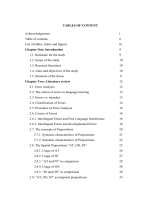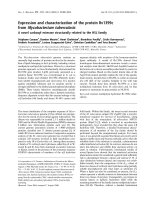Words Related to the Human Body
Bạn đang xem bản rút gọn của tài liệu. Xem và tải ngay bản đầy đủ của tài liệu tại đây (137.92 KB, 17 trang )
H
ere is a pop quiz:Who was Gluteus Maximus? Even though it
sounds like the name of some ancient Roman general, gluteus
maximus is actually the name of a muscle. Its claim to fame is that
it’s the largest muscle in the human body. Can you guess where one
can find it? Hint: you sit on it. An incredible machine, the human
body is a source of many fascinating facts, discoveries, and tidbits.
Here is one more: Who has a greater number of bones, babies or
adults? Babies have more than 300 bones, while adults have just
206. As we grow, many bones in our body fuse together.
Here are a few terms that are synonyms for better-known
words relating to the human body.
nares (NAR-eez), singular naris
noun The nostrils or nasal passages.
From Latin nares, plural of naris (nostril).
This word shares the same root (nas-) with nose, nuzzle, nostril,
nasal, and pince-nez.
● “There’s a fine frost around their eyes and nares.”
—Alaska
90
CHAPTER 22
Words Related to
the Human Body
cmp03.qxd 7/21/05 12:16 PM Page 90
oxter (OK-stuhr)
noun The armpit.
From Old English oxta. The Latin form is axilla.Both allude to the
idea of the axis around which the arm rotates.
● “I got lumbered in the three-legged race with a guy so much
shorter than me that he barely came up to my armpit. It would
have been easier for me to have tucked him under my oxter
and just carried him to the finish.”
—Guardian (London)
pollex (POL-eks), plural pollices
noun The thumb.
From Latin pollex.
Hallux is the equivalent term for the big toe.
● “He caught his thumb between his gun and a sharp rock. It was
a nasty cut spurting blood. I said,‘Ben, that’s it. We’ve got to get
you to a doctor.’‘Heck no, let’s get a turkey first,’ answered Ben,
quickly wrapping his dripping pollex with a handkerchief.”
—Albany (N.Y.) Times Union
W ORDS RELATED TO THE HUMAN BODY
91
Facts do not cease to exist because they are ignored.
—
A
LDOUS
H
UXLEY
, author (1894–1963)
Oxtercog
When settlers came here in the 1600s, they brought with
them many words from seventeenth-century England and
Scotland, which comprise a dialect now known as “Ulster-
Scots.”While in England words such as oxter have fallen out
of everyday use, they are still heard frequently here. A related
word is the verb oxtercog, which means to drag somebody
along by their armpits—people often need to be oxtercogged
to a taxi after they have had one drink too many.
—Wesley Johnston, Newtownabbey, Northern Ireland
cmp03.qxd 7/21/05 12:16 PM Page 91
nevus (NEE-vuhs)
noun A congenital blemish on the skin, such as a mole or birth-
mark.
From Latin naevus (mole).
● “Stephany had a hairy nevus, a big mole on her cheek right
underneath the eyelid and across the nose.”
—San Diego Business Journal
glossal (GLOS-uhl)
adjective Of or pertaining to the tongue.
From Greek glossa (tongue).
● “Anthony Herrel, a researcher at the University of Antwerp,
wondered how chameleons capture creatures nearly one-sixth
their size—the equivalent of a human bagging a large turkey—
using only their glossal appendages. Granted, the lizards’ sling-
shot tongues are comparatively longer than humans’ tongues,
but that still doesn’t account for chameleons’ prodigious snar-
ing abilities.”
—National Wildlife
92
ANOTHER WORD A DAY
A man cannot be comfortable without his own approval.
—
M
ARK
T
WAIN
, author and humorist (1835–1910)
cmp03.qxd 7/21/05 12:16 PM Page 92
W
hen I came to the United States to study many years ago,
I quickly realized that the laws of economics don’t apply here.
When you buy something, you actually save, rather than spend. The
more you buy, the more you save. Buy and Save . . . isn’t there
something wonderful about this whole thing? I figured that if I
bought a new car every month, the money I saved as a result would
easily pay for my graduate school. I marveled at the compassion
and generosity of the shopkeepers who were willing to forgo as
much as 70, 80, or even 90 percent of the price of things several
times a year, perhaps just to help out impecunious graduate students
like me. Be it Labor Day, Presidents’ Day, or Memorial Day, they’d
join in the spirit and open their doors for people to come in and
save. I wrote home:
Dear Mother and Father,
Today is Memorial Day in the United States. On this day
we recognise the sacrifices of members of the armed forces
who gave their lives to protect this truly great country. Like
my American friends, I’m also going to observe this solemn
day by visiting some Memorial Day sales and cookouts.
93
CHAPTER 23
Words Related to
Buying and Selling
cmp03.qxd 7/21/05 12:16 PM Page 93
Well, a long time has passed since then. I no longer call store
owners shopkeepers. And I spell recognise as recognize now. But I
wonder. What does it mean to buy something? What do we buy
when we buy something? When we buy Coke, for instance, are we
simply hoping to get carbonated, sweetened, and colored water, or
something more? Coolness and confidence, maybe? The ability to
attract the opposite sex, perhaps? What do you think?
emptor (EMP-tor)
noun A buyer.
From Latin emptor (buyer), from emere (to buy, take). Ultimately
from the Indo-European root em- (to take), which is also the ances-
tor of such terms as preempt (literally, to buy beforehand), example
(to take out something), premium (inducement to buy), prompt (to
be quick in taking), redeem (to buy again), vintage (to take from
vinum, grapes), and caveat emptor (buyer beware).
● “American ‘retail anthropologist’ Paco Underhill is one of the
plumbers. Mr. Underhill makes his living watching homo
emptor—the king and queen of retail, otherwise known as the
shopper: you and me. One of his findings: ‘Men are buying
their own underpants.’”
—Dominion (New Zealand)
94
ANOTHER WORD A DAY
While we are asleep in this world, we are awake in another one.
—
S
ALVADOR
D
ALÍ
, painter (1904–1989)
What’s in a Name?
In an episode of the BBC sitcom Absolutely Fabulous,onioma-
niac Edina receives a gift of earrings from her daughter. “Are
they Lacroix?” she asks eagerly. “Do you like them?” asks her
daughter. “I do if they’re Lacroix,” replies Edina.
—Ruth Ann Harnisch, New York, New York
cmp03.qxd 7/21/05 12:16 PM Page 94
nummary (NUM-uh-ree)
adjective Pertaining to coins or money.
From Latin nummarius,from nummus (coin).
● “‘Originally the nummary Denomination of Silver,’ observed
William Douglass, a physician who commented on economic
affairs,‘seems to have been the same as its Weight.’”
—New England Quarterly
duopoly (doo-OP-uh-lee, dyoo-)
noun A market, political, or other situation in which control is in
the hands of two persons or groups.
From duo- (two) + -poly, patterned after monopoly.
● “Jennifer Capriati politely denies the popular notion that she
alone can break the duopoly of the Williams sisters in this year’s
championships.”
—Guardian (London)
monopsony (muh-NOP-suh-nee)
noun A market condition in which there is only one buyer for a
product or service that’s being sold by many.
From Greek mono- (one) + opsonia (purchase of provisions).
W ORDS RELATED TO BUYING AND SELLING
95
Some fellows pay a compliment like they expected a receipt.
—
K
IN
H
UBBARD
, humorist (1868–1930)
Two Sides of the Same Coin
In Mandarin the words buy and sell are the same in the spo-
ken language, differing only in the tone used. And the two
words together mean business.
—Rachel Zurvas, Brisbane, Queensland,Australia
cmp03.qxd 7/21/05 12:16 PM Page 95









